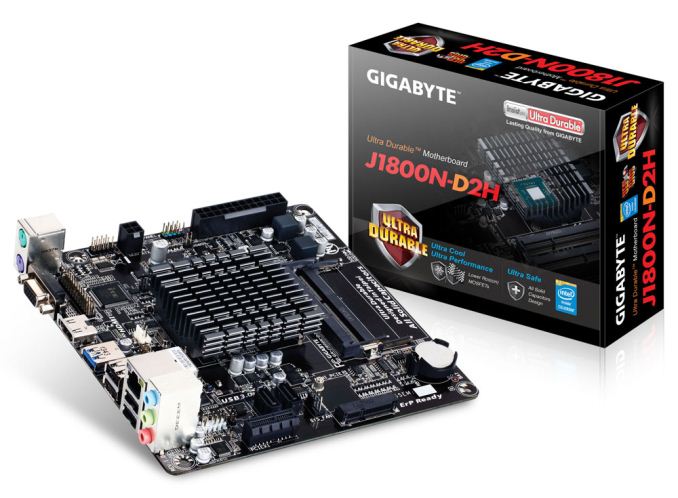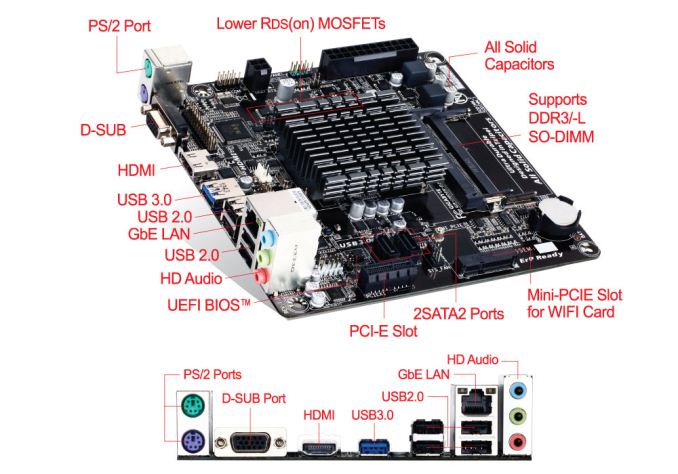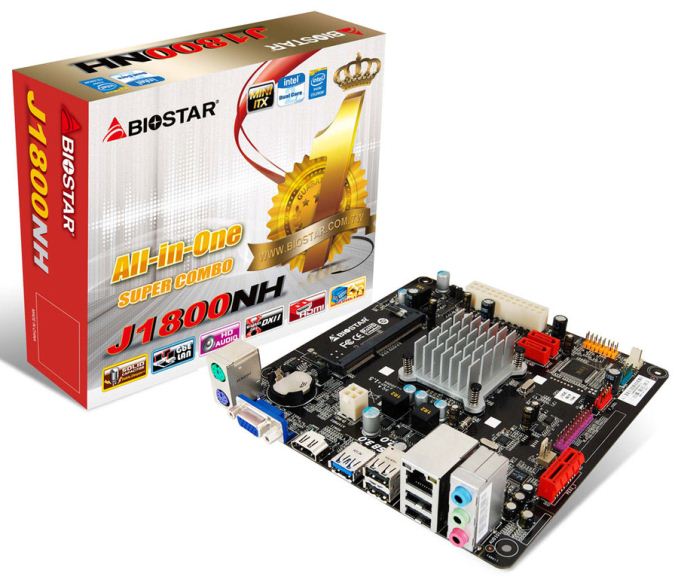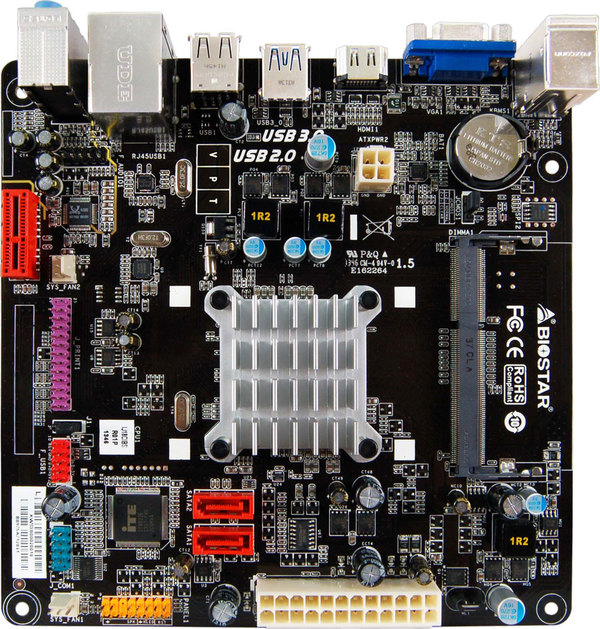10W Bay Trail-D Coming To Market from GIGABYTE and Biostar
by Ian Cutress on February 4, 2014 10:36 AM EST- Posted in
- Motherboards
- CPUs
- Biostar
- Gigabyte
- Fanless
- Silvermont
- SoCs
- Bay Trail

News on the grapevine is filtering down for Bay Trail-D. We have had the 20W Avoton server equivalent processor in our offices for a little while now, but alongside this Intel have 10W consumer based Celerons to market. With the chips being a ball-grid-array arrangement it is up to the motherboard manufacturers to provide the base on which these processors sit. Alongside some display from MSI at CES, GIGABYTE and Biostar are coming to market with their versions.
From GIGABYTE, this is the J1800N-D2H, using the 10W Intel Celeron J1800 Bay Trail-D SoC, a dual core Silvermont CPU starting at 2.41 GHz with turbo up to 2.58 GHz. N in the name indicates mini-ITX, and D2H positions the motherboard at the lower end in terms of specifications. The board itself uses a passive heatsink to cool the CPU (more than understandable for 10W), two DDR3L SO-DIMM 1333 MHz slots (1.35V memory only), a D-sub and HDMI audio output, two PS/2 ports, USB 3.0, a USB 2.0 hub, two SATA 3 Gbps ports, a PCIe 2.0 x1 slot, a mini-PCIe slot, Realtek ALC887 audio and Realtek NIC, all in a 17cm square form factor.
The Biostar J1800NH is a similar product with the Celeron J1800 SoC, using instead a single DDR3L SO-DIMM slot, fewer USB 2.0 ports and a Realtek ALC662 audio codec instead.
What is perhaps more surprising is the pricing. The Biostar motherboard is currently available for $56 with a $60 MSRP – the GIGABYTE motherboard, and the MSI one at CES, should be around $60 as well. However this SoC, sold by Intel, is listed as $72 tray price (i.e. in batches of 1000). This means either that these manufacturers are getting them at a discount, or selling them at a loss.
The purpose for Bay Trail-D is tablet like performance in a desktop form factor, with perhaps the added advantage of expandability and connectors. Users wanting quad core solutions will have to keep eyes peeled for J1850/J1900 versions, or jump to Pentium J2850/J2900. We saw that ECS was going to release a line of these motherboards last year. As mentioned, we have Avoton in to test, specifically Intel’s 8-core Silvermont solution for IPC/servers. Keep your eyes peeled for that review.
Sources: Fanless Tech via Liliputing via Tech Report.

















55 Comments
View All Comments
mczak - Tuesday, February 4, 2014 - link
In fact all Bay Trail cpus are 64bit capable.(Though the z atom platforms such as the transformer t100 came with 32bit uefi bios so far which made it more or less impossible to use in 64bit mode even with linux, but I'm pretty sure these here shouldn't have any such problems, they officially also support windows 64bit).
plupien79 - Tuesday, February 4, 2014 - link
That's a perfect machine for XBMC ala OpenELECif it came with dual Intel NICs it'd be an epic router board
iamkyle - Tuesday, February 4, 2014 - link
I'd argue that you could put an Intel gigabit NIC in the free slot and use the mPCIe for wireless and you'd easily have a router that could top the best offerings from ASUS, Netgear, etc.Metaluna - Tuesday, February 4, 2014 - link
Problem is, some router distros like PFsense are pretty far behind in supporting the newer Intel NICs (and even worse for wireless NICs). So you might end up having to add a dual PCIe NIC card anyway, which then rules out a lot of really compact mini-ITX cases like the Mini-Box M350.ddriver - Tuesday, February 4, 2014 - link
Hmm let's see, castrated PCI-E slot, only 2 S-ATA connectors, SO-DIMM, it does look manufacturers did a good job crippling potentially good products.Flunk - Tuesday, February 4, 2014 - link
The motherboard manufacturer is doing nothing of the kind, this SOC only supports 2 SATA ports, 2 PCI-E and DDR3L. There isn't anything they can do about that. Remember, is a tiny little cut-rate chip. It's amazing that they can bundle a CPU and motherboard of any kind for ~$60, let alone one that is actually capable of running desktop applications and Windows.DanNeely - Tuesday, February 4, 2014 - link
It's worth mentioning that the single USB3 port is also an SoC limit.stepz - Wednesday, February 5, 2014 - link
Looks like Intel is extremely worried about causing damage to their regular desktop market to release a product this crippled. This artificial market segmentation is what you get when you don't have competition. Lets hope one of the ARM vendors will force their hand to release more useful chips.xdrol - Tuesday, February 4, 2014 - link
The SoC does support 64 bit (unlike the early Atoms), and Gigabyte only provides 64 bit Win8 drivers - I guess SteamOS should work.Penti - Wednesday, February 5, 2014 - link
Both of the boards only supports 64-bit Windows 8, both has 64-bit UEFI. GNU/Linux shouldn't be much of an issue. That Bay-Trail-M doesn't have drivers is because Windows doesn't yet support connected standby on 64-bit versions.